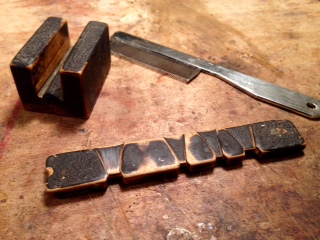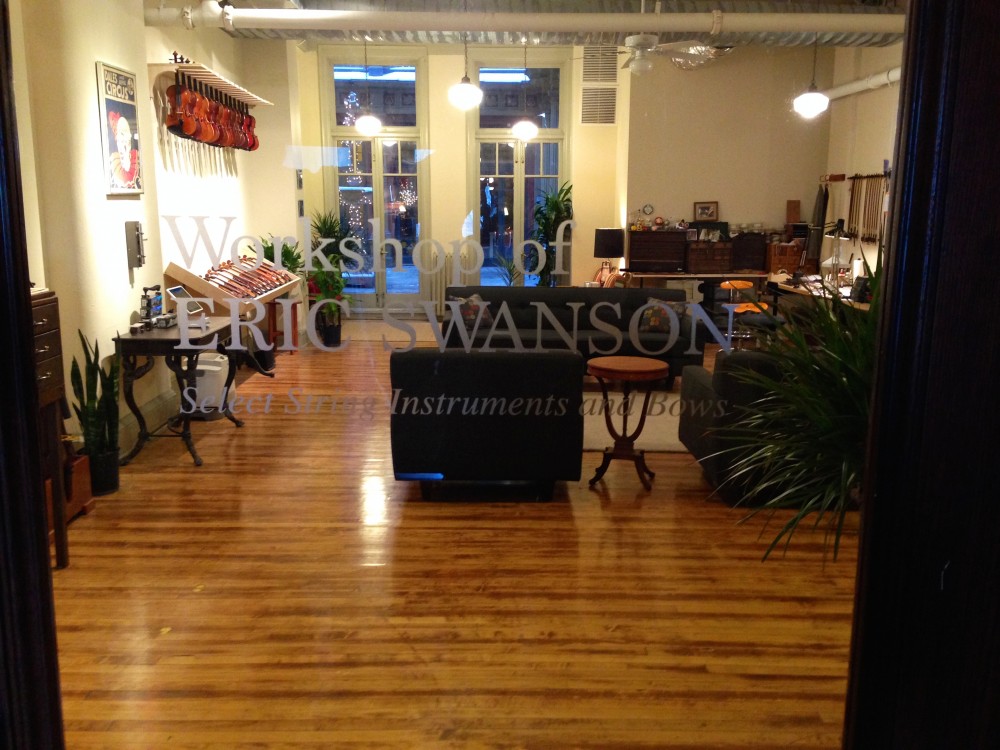
Last week I went off on one off my periodic rehair trips, this time to Cincinnati. I do these working visits as a service to musicians who feel they may have difficulty accessing decent bow-work and as a kind of professional outreach which advertises the shop and what it represents. I usually bring along some bows and instruments for sale as well. These trips also give me the opportunity to have a beer or two with old colleagues, reconnect and compare notes.
There I was in a friend’s workshop with my little portable rehair “kit” doing about 15 rehairs a day, with no time to even stop for a bite of lunch, feeling somewhat overwhelmed and vulnerable. I got to thinking about the fundamentals of rehairing, craftsmanship and the tenets of good business practice. Those thoughts during those two insanely busy days are what have inspired this essay.
The main concept I want to emphasize is that rehairing is a service job. It is not a fine art, although it certainly is a difficult craft. There are certainly many ways of rehairing, but I for one don’t care which method is used, only that the result is good. One must also realize that there is no single perfect rehair – customers have different expectations and preferences. Because of this, it may take several rehairs before you and the customer can find the best result. Getting to know customers is important when doing rehairs. Relationships take time as does building a successful bow business. This is why doing a quick rehair trip in an area where you don’t know people can be perilous.
When I first started down the bow-work road, a more experienced professional in the field who worked only on violins expressed his fear of doing rehairs. He said that one bad rehair or one failed plug could sink your reputation and ruin your career. He regarded the whole thing as a high-wire act with little reward for the danger. Often rehairs are done at shops by an anonymous, underpaid and often only partly trained employee, so the shop owner can blame any problems with a customer’s bow on someone else. However, if you are a one man shop specializing in bow work, there is nowhere to hide and no one else to blame.
This is why changing bow hair is a service job, like a car mechanic. The nature of the bow is that something will go wrong eventually. It’s not a matter of if but when. A person doing rehairs will see a customer and their bow three, maybe even four times a year. The frequency of rehairs statistically increases the possibility that a wedge will fail, a knot will slip, a plug will pull out, the hair gets too tight/loose, or that some other small, yet important detail will just not meet the needs of the player. It’s true that once the bow leaves the shop we have no control over how well the hair is rosined, whether the player over tightens or forgets to loosen the stick, if they play aggressively and break hairs, or if they keep their instrument and bow in overly dry or humid conditions. However, it’s much smarter to take responsibility for one’s work than to place the blame on the player.
Some people take a long time to do rehairs, which is fine, but I do them quickly and have a high volume, which is necessary if one is to make any money at all doing this for a living. When I first saw how Yung Chin was working when I visited him in the late 90’s, I knew I had found a way of rehairing and of doing business that suited me. I offer clients same day rehairs at a price that is lower than most of the rest of the country. I always tell new customers that a free lengthening or tightening of the hair is included (I build this into every rehair), that if they don’t like the hair I always have at least one alternative for them to try (at no additional charge), and that if they have any issues or concerns at all that they must feel free to contact me. I’d rather have a customer return for a quick easy fix than feel stuck with something they don’t like. In fact, most of my oldest customers are folks for whom I had to adjust or redo something. Standing behind my work is very important to me and I’d rather spend 15 minutes redoing a rehair for free than lose a customer forever. It’s amazing how many shops don’t get this.
One needs to develop a thick skin to specialize in bow work and rehairs. It can be too easy to get carried away with your own importance or go the opposite route and take each and every issue that will inevitably come up personally. Finding a good balance between self-worth and humility can be difficult when you work with your hands. Some customers will come down on your for no apparent reason, or blow small issues out of proportion. A musician’s bow is a highly personal item of so much importance, that some seemingly over-the-top reactions can be forgiven or at least better understood. Many issues are the result of misunderstanding and/or lack of knowledge – here I work hard to educate and empower my clients. I also want to say here that I have been on the receiving end of much thankfulness and generosity on behalf of my customers. I have learned so much from them. If you run your own business and work to build good relationships, you will weed out those who just will never get what you are doing, meet amazing people and advance your knowledge and happiness profoundly.
And please know that whatever you do, if your work in a service industry, you will run into problems. The trick is not to let problems take over by developing a way of running your business that quickly handles objections and complaints and realize that no matter how serious you are about doing the best work you can do, not everyone is going to like it.
